 Petzlover
Petzlover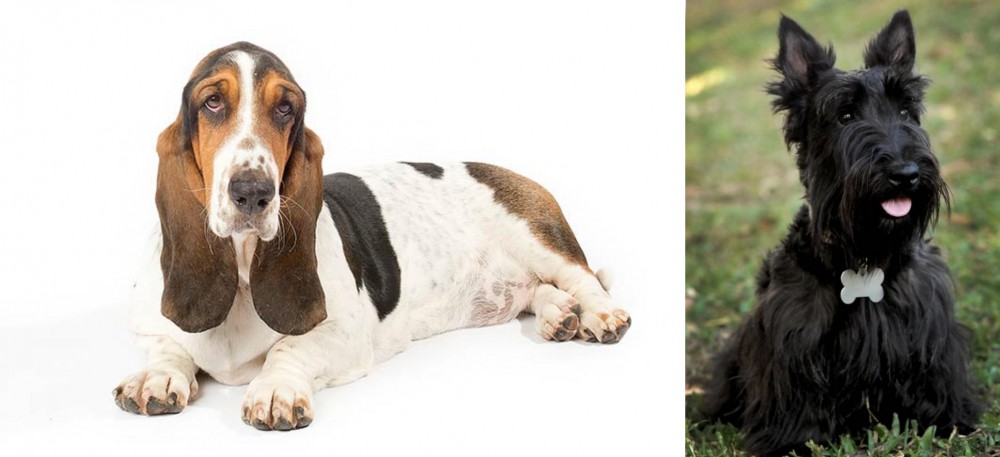 Basset Hound is originated from France but Scoland Terrier is originated from United Kingdom. Basset Hound may grow 11 cm / 5 inches higher than Scoland Terrier. Basset Hound may weigh 19 kg / 42 pounds more than Scoland Terrier. Basset Hound may live 4 years less than Scoland Terrier. Both Basset Hound and Scoland Terrier has same litter size. Basset Hound requires Moderate Maintenance. But Scoland Terrier requires High Maintenance
Basset Hound is originated from France but Scoland Terrier is originated from United Kingdom. Basset Hound may grow 11 cm / 5 inches higher than Scoland Terrier. Basset Hound may weigh 19 kg / 42 pounds more than Scoland Terrier. Basset Hound may live 4 years less than Scoland Terrier. Both Basset Hound and Scoland Terrier has same litter size. Basset Hound requires Moderate Maintenance. But Scoland Terrier requires High Maintenance
 The Basset is a French dog bred in Great Britain in the late 1800s. The history of the Basset goes way back to ancient times as there have been discoveries of short legged dogs found in the catacombs of Egypt. These dogs also became popular during Emperor Napoleon III’s reign. Controlled breeding of the Basset began in France in 1870.
The Basset is a French dog bred in Great Britain in the late 1800s. The history of the Basset goes way back to ancient times as there have been discoveries of short legged dogs found in the catacombs of Egypt. These dogs also became popular during Emperor Napoleon III’s reign. Controlled breeding of the Basset began in France in 1870.
Hunting was popular with noblemen during the Middle Ages, and Francois Hubert bred hounds for this purpose. After his death, in his honor, the monks named the hounds bred at the monastery the St. Hubert's Hound. It is accepted that the St. Hubert's Hound is an early ancestor of many hound breeds that we see today.
French Bassets were imported into England in the 1870s. Everett Millais, thought to be the father of the modern Basset Hound, bred such dog to a Bloodhound to create a heavier Basset. The puppies were later refined with English- and French Bassets, and the first breed standard for the Basset Hound was made in the UK at the end of 19th century. To this day, many cartoon dogs are based on this extraordinary looking dog, and they also appear in adverts, a popular one being the logo for Hush Puppies, a shoe brand.
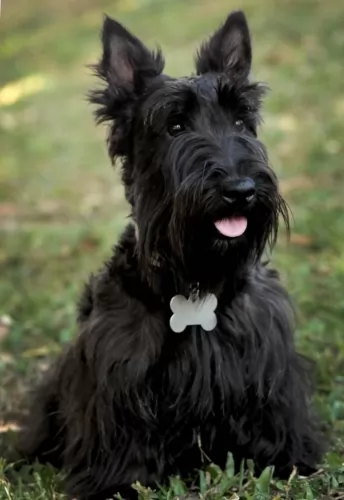 Not much is known about the Scoland Terrier. It is not a purebred but rather a crossbreed developed by crossing the Scottish Terrier with the Westland Terrier. To understand these mixed breeds, look to the original breeds for any combination of the characteristics of the breeds. The offspring of this crossing is not a 50-50 split of the original breeds looks or temperament.
Not much is known about the Scoland Terrier. It is not a purebred but rather a crossbreed developed by crossing the Scottish Terrier with the Westland Terrier. To understand these mixed breeds, look to the original breeds for any combination of the characteristics of the breeds. The offspring of this crossing is not a 50-50 split of the original breeds looks or temperament.
Because the Scoland Terrier is a mix between the Scottie and the Westie he has all the characteristics of a typical terrier perhaps even twice as much. With both parents being terriers, you can expect your Scoland to act like a short legged terrier. These dogs are known for their courage and tenacity. Today these terriers are family companions. Most terriers today come from a pool of ancestral dog in the 19th century in Europe. This information was gleaned from a genetic analysis done in 2006.
The Scoland Terrier, being a hybrid, is not acknowledged by the American Kennel Club (AKC) or the United Kennel Club (UKC). It is acknowledged by the International Designer Canine Registry (IDCR), American Canine Hybrid Club (ACHC), Dog Registry of America, Inc. (DRA), Designer Dogs Kennel Club (DDKC) and Designer Breed Registry (DBR).
 The Basset Hound is a scent hound, a short-legged breed of dog belonging to the hound family. He is renowned for his long body, his loose skin and the very characteristic long, droopy, low-set ears. This is also a dog that drools a lot. The Basset Hound stands only 33 – 38 cm in height. You wouldn’t call him a small dog as he is robust and solid, weighing anything from 18 to 30kg. The Basset Hound is also well known for his eyes, where the red of the lower eyelid shows. Their calm, serious expression is also a familiar and much loved feature of these dogs.
The Basset Hound is a scent hound, a short-legged breed of dog belonging to the hound family. He is renowned for his long body, his loose skin and the very characteristic long, droopy, low-set ears. This is also a dog that drools a lot. The Basset Hound stands only 33 – 38 cm in height. You wouldn’t call him a small dog as he is robust and solid, weighing anything from 18 to 30kg. The Basset Hound is also well known for his eyes, where the red of the lower eyelid shows. Their calm, serious expression is also a familiar and much loved feature of these dogs.
The Basset is a short-haired dog, but in spite of that he sheds constantly. Coat colors can vary but the most common colors are white, tan and black – a tri-color coat.
This scent hound is a friendly canine, outgoing and playful. He gets on well with children and other pets in the family, and training and socialization can make him even more amicable with them. He adapts easily to life in the city or in the country.
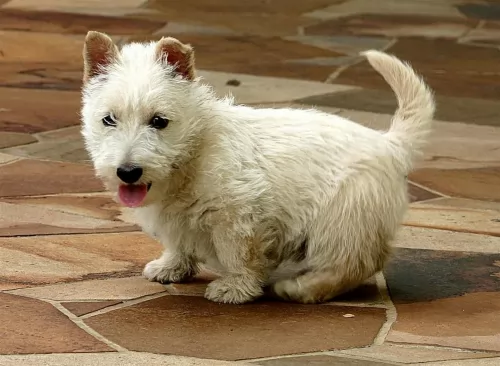 Being a hybrid, the Scoland Terrier will not always look alike and could look like a Scottie, a Westie or a combination of the two. Most breeders of this designer dog say it usually has a body like the Scottie and a round head like the Westie. They are more often black with white markings, but they can often be wheaten as well. With round dark eyes, a scissors bite and black nose, her face is unique. The breed has erect and small, triangular ears and a medium fluffy tale. The coat is hard and wiry, with a dense soft undercoat.
Being a hybrid, the Scoland Terrier will not always look alike and could look like a Scottie, a Westie or a combination of the two. Most breeders of this designer dog say it usually has a body like the Scottie and a round head like the Westie. They are more often black with white markings, but they can often be wheaten as well. With round dark eyes, a scissors bite and black nose, her face is unique. The breed has erect and small, triangular ears and a medium fluffy tale. The coat is hard and wiry, with a dense soft undercoat.
 The Basset's long body with his short legs give him a unique look. Add to that this breed is among the most even-natured and easy-going. It is why he makes such a cool pet. While he adapts well to both city living and country living, you can’t afford to let him become a couch potato. Sitting around and eating consistently will just make your best friend sick and increase your medical bills for him.
The Basset's long body with his short legs give him a unique look. Add to that this breed is among the most even-natured and easy-going. It is why he makes such a cool pet. While he adapts well to both city living and country living, you can’t afford to let him become a couch potato. Sitting around and eating consistently will just make your best friend sick and increase your medical bills for him.
The amicable Basset Hound is child friendly and because he isn’t particularly territorial, he will be alright with your other pets too. If you're looking for a wonderful friend who will be loyal to you, the Basset is waiting to fill the role of companion for you.
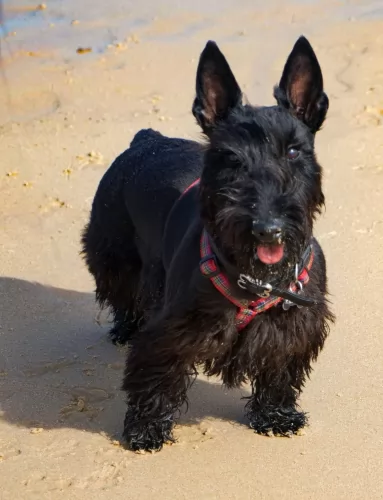 1.Children friendliness - they can be very good with children and children can help them get their exercise.
1.Children friendliness - they can be very good with children and children can help them get their exercise.
3.Adaptability - yes but she is adept at digging and must have a safe enclosure.
 The Basset Hound is a pretty robust breed and with proper nutrition and exercise, can live up to 12 years of age but this particular breed is prone to some major health conditions.
The Basset Hound is a pretty robust breed and with proper nutrition and exercise, can live up to 12 years of age but this particular breed is prone to some major health conditions.
Cherry Eye is seen quite often in Basset Hounds. It is very painful because the tear gland tears away and it will require surgery before infection sets in. Also, glaucoma is an inherited eye disease that needs to be checked out as it can lead to blindness. The eye is red and the dog is constantly rubbing at it.
This is when the cartilage in the Basset’s joints don’t attach to the bone properly. It is known as osteochondritis dissecans or OCD. Be careful to stick to the recommended growth rate suggestions for feeding with a Basset puppy.
Basset Hounds are more prone to a heart condition known as dilated cardiomyopathy, or DCM. It is where the heart becomes large and weak so that it battles to pump blood to the body.
Other illnesses to look out for are Canine Hip Dysplasia and obesity.
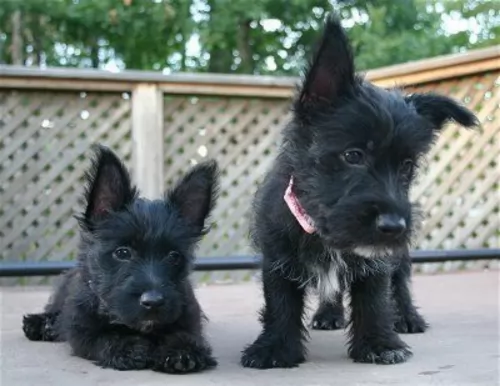 This hybrid dog can inherit any of the issues faced by its two parent breeds. For the Scoland Terrier this can include:
This hybrid dog can inherit any of the issues faced by its two parent breeds. For the Scoland Terrier this can include:
• Seborrhea – Skin disease that can cause dogs to scratch until bleeding and/or infected.
• Carniomandibular Osteopathy -called lion’s jaw this is a developmental disease that causes extensive changes in the bones of the mandible and skull.
• Pulmonic Stenosis – when the blood flowing from the heart’s right ventricul to the pulmonary artery is blocked.
• PPM or Persistent Pupillary Membranes - causes visual impairment when the membranes do not dissolve after birth.
• Chronic Hepatitis – disease of the liver that can eventually cause major damage.
 Watching his diet. He will need quality, nutritious food and plenty of exercise.
Watching his diet. He will need quality, nutritious food and plenty of exercise.
It is also a good idea to get into the habit of brushing his teeth a couple of times a week with a special dog toothbrush and toothpaste. Never use toothpaste made for humans.
Clean his long ears and keep them dry. The vet will show you precisely how.
Be sure to see that he get his puppy vaccinations, and that you continue to give him vet check-ups when he shows signs of sickness.
He has low grooming needs but brush his coat twice a week to get rid of dull, loose hairs.
He is a smart, active dog with lots of energy so set aside time to have ball games with him and to get him out of the yard with walks.
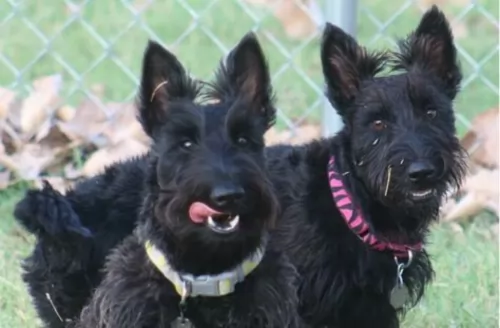 1.Feeding the puppy - Give a high quality puppy dog food designed for terriers or active medium sized dogs. Give ¾ of a cup over 3 meals a day.
1.Feeding the puppy - Give a high quality puppy dog food designed for terriers or active medium sized dogs. Give ¾ of a cup over 3 meals a day.
2.Feeding the adult – Give a high quality adult dog food designed for terriers or active medium sized dogs. Give one cup over two meals a day.
4. Games and Exercises – The Scoland Terrier is a very active dog and needs daily exercise, He need time to play, run, and be stimulated by games. She would be very good at flyball, Frisbee, fetch, agility, barn hunt, and obedience. He needs at least 2 hours of play and exercise everyday.